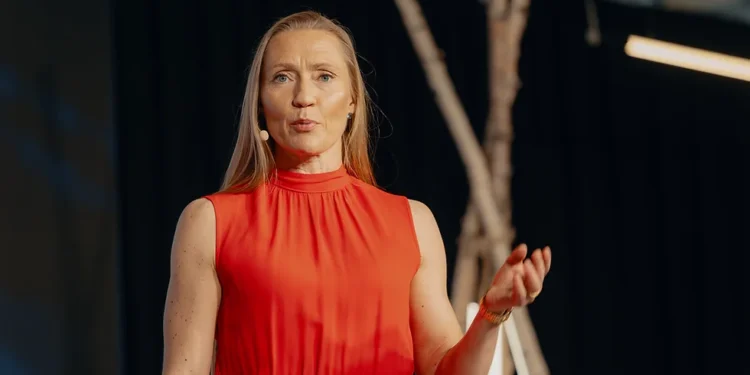For many individuals in today’s workforce, the rapid emergence of artificial intelligence technology might feel sudden and unexpected. There was an era when we went through our daily tasks without giving much thought to AI and its ramifications, but then it appeared to infiltrate every aspect of our lives.
This rapid change can certainly be intimidating, perhaps even overwhelming. If you believe you’re feeling the pressure, consider how Elin Hauge might feel.
“I ought to send a thank-you card to Sam Altman for keeping us busy,” she chuckles, alluding to the innovative entrepreneur, investor, and programmer who serves as the CEO of OpenAI.
“The debut of ChatGPT in November [2022] has led to widespread confusion. Many people I’m acquainted with are genuinely perplexed. ‘What should I do? What is this? Is it going to dominate the world? What is my role—assistance!’”
Hauge, a business strategist based in Norway known for her expertise in emerging technologies like AI, virtual reality, IoT, and blockchain, is well-acquainted with AI applications. They have been her main area of exploration since 2016. Prior to that, she dedicated over ten years to utilizing her master’s degrees in biophysics, medical technology, management science, and operational research to aid business leaders in navigating other data-centric technologies.
“My job involves bridging the gaps—translating between business objectives and technology—and linking different fields,” she describes. “These fields can vary tremendously, ranging from law to psychology to philosophy and culture.”
Elin Hauge discusses the omnipresent role of AI
The interesting aspect of AI, as Hauge describes, is its vast applicability: in various sectors and in countless ways. “We often believe it has to be large, headline-grabbing cases,” she remarks. “We look for the sensational. Yet, the truth is that many AI applications occur without our awareness.” In essence, it’s not solely about self-driving vehicles or facial recognition systems; it encompasses online retail and the curation of social media feeds as well.
Nonetheless, Hauge recognizes the anxiety and trepidation surrounding AI technology. (She admits to having her own reservations.) “When discussing the implications of AI, we must look beyond just the technology itself. Once you start using data representing an entire population to make individual decisions, that’s where the complexities of big data become convoluted for us humans,” she explains.
To illustrate, she references the body mass index (BMI). Although medical professionals agree on its utility for assessing large populations’ health trends, it fails to accurately reflect individual health. Different bone densities and muscle masses can result in substantial variability among individuals. Consequently, numerous scientists have arrived at the conclusion that these variances render BMI an inadequate metric for evaluating health.
“This parallels what we encounter when discussing employing AI with data from large groups to inform individual decisions,” Elin Hauge articulates. “We are essentially generalizing trends from a larger group and applying them to me—which may not be representative of my reality! This misalignment can lead us into significant difficulties.”
“Conversely, when we leverage AI for clearly beneficial instances—like recommending books or music,” she elaborates. “I often pose this question to my audience: ‘How many of you listened to music during your commute today? How many use Spotify?’ Spotify exemplifies the use of AI through machine learning to generate suggestions, which we universally accept.”
Artificial Intelligence: A strategy or simply a toolbox?
A considerable portion of her efforts involves clarifying misconceptions around AI, and her expertise has made her a sought-after strategist. Hauge serves as the board chair for three technology startups and on the boards of two consulting firms, where she guides the integration of AI within business strategies. She stresses that AI is merely one element of a larger business framework.
“I continually emphasize that AI isn’t a strategy itself; it’s merely a toolkit. Admitting this doesn’t win me many allies in the consulting field, as some firms thrive on promoting AI strategy consultations,” she laughs. “Now, [major corporations] are all buzzing about generative AI.”
This perspective partly informs Hauge’s prediction of an impending lull in the AI sector. Reflecting on her years of experience with these technologies, she notes oscillations in interest, describing periods of “winters and summers” in AI. Presently, we find ourselves in a fervent era, but she anticipates a cooling phase ahead.
Elin Hauge maintains a practical view of AI
However, that doesn’t imply AI is on the verge of vanishing—quite the opposite.
“What’s the very first action most individuals undertake in the morning?” Hauge asks, somewhat playfully. The candid answer is typically: “I check my phone.”
Hauge outlines a hypothetical scenario for a standard morning for a typical employee. You likely switched off a morning alarm from your mobile device. Then perhaps you checked the weather or traffic updates, or indulged in scrolling through TikTok or Twitter, now branded as X. You might have listened to music via Spotify while showering, or explored eBay, or skimmed through Google News. In all these instances—ranging from weather forecasts to social media algorithms—predictive AI plays an integral role.
“You get it, right? I could continue,” she states. “It’s pervasive, yet we seldom acknowledge it. We overlook it because it has woven itself into the fabric of our routine. What awaits us is the same level of integration with generative AI tools; they will naturally become a fundamental aspect of everyday life.”
She likens AI to smartphones, tablets, and electric vehicles.
“We will all acclimate to them,” she states. “And we will reminisce, ‘Ten years prior, we didn’t have these resources.’”


